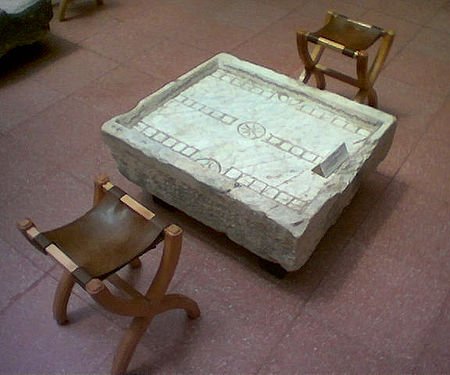Ludus (ancient Rome) on:
[Wikipedia]
[Google]
[Amazon]

 ''Ludus'' (plural ''ludi'') in ancient Rome could refer to a primary school, a board game, or a gladiator training school. The various meanings of the
''Ludus'' (plural ''ludi'') in ancient Rome could refer to a primary school, a board game, or a gladiator training school. The various meanings of the

 ''Ludus'' (plural ''ludi'') in ancient Rome could refer to a primary school, a board game, or a gladiator training school. The various meanings of the
''Ludus'' (plural ''ludi'') in ancient Rome could refer to a primary school, a board game, or a gladiator training school. The various meanings of the Latin
Latin ( or ) is a classical language belonging to the Italic languages, Italic branch of the Indo-European languages. Latin was originally spoken by the Latins (Italic tribe), Latins in Latium (now known as Lazio), the lower Tiber area aroun ...
word are all within the semantic field
In linguistics, a semantic field is a related set of words grouped semantically (by meaning) that refers to a specific subject.Howard Jackson, Etienne Zé Amvela, ''Words, Meaning, and Vocabulary'', Continuum, 2000, p14. The term is also used in ...
of "play, game, sport, training" (see also ludic).
An elementary or primary school
A primary school (in Ireland, India, the United Kingdom, Australia, New Zealand, Trinidad and Tobago, Jamaica, South Africa, and Singapore), elementary school, or grade school (in North America and the Philippines) is a school for primary ...
or the school of the "litterator" attended by boys and girls up to the age of 11 was a ''ludus''. ''Ludi'' were to be found throughout the city, and were run by a '' ludi magister'' (schoolmaster
A schoolmaster, or simply master, is a male school teacher. The usage first occurred in England in the Late Middle Ages and early modern period. At that time, most schools were one-room or two-room schools and had only one or two such teacher ...
) who was often an educated slave
Slavery is the ownership of a person as property, especially in regards to their labour. Slavery typically involves compulsory work, with the slave's location of work and residence dictated by the party that holds them in bondage. Enslavemen ...
or freedman
A freedman or freedwoman is a person who has been released from slavery, usually by legal means. Historically, slaves were freed by manumission (granted freedom by their owners), emancipation (granted freedom as part of a larger group), or self- ...
. School started around six o'clock each morning and finished just after midday. Students were taught math, reading, writing, poetry, geometry and sometimes rhetoric.
The word ''ludus'' also referred to a training school for gladiators; see Gladiator: Schools and training. Examples include the Ludus Magnus and Ludus Dacicus.
''Ludus'' was also the word for a board game, examples of which include ''ludus latrunculorum
''Ludus latrunculorum'', ''latrunculi'', or simply ''latrones'' ("the game of brigands", or "the game of soldiers" from ''latrunculus'', diminutive of ''latro'', mercenary or highwayman) was a two-player Abstract strategy game, strategy board gam ...
'' and ''ludus duodecim scriptorum
Ludus duodecim scriptorum, or XII scripta, was a board game popular during the time of the Roman Empire. The name translates as "game of twelve markings", probably referring to the three rows of 12 markings each found on most surviving boards. T ...
'', or a game played with knucklebones
Knucklebones, also known as scatter jacks, snobs, astragaloi (''singular'': astragalus), tali, dibs, fivestones, jacks, jackstones, or jinks, among many other names, is a game of Fine motor skill, dexterity played with a number of small objects ...
(''astragali'').
Latin poetry often explores the concept of ''ludus'' as playfulness, both in the writing of poetry as a kind of play and as a field for erotic role-playing. "Poetic play (''ludus'', ''ludere'', ''iocum'', etc.)," Michèle Lowrie observes, "denotes two related things: stylistic elegance of the Alexandrian variety and erotic poetry."Michèle Lowrie, ''Horace's Narrative Odes'' (Oxford University Press, 1997), p. 41.
''Ludi
''Ludi'' (Latin:games; plural of "ludus") were public games held for the benefit and entertainment of the Roman people (''populus Romanus''). ''Ludi'' were held in conjunction with, or sometimes as the major feature of, Roman religious festiv ...
'', always plural, were the games held in conjunction with Roman religious festivals.
See also
*Lusus Troiae
The ''Lusus Troiae'', also as ''Ludus Troiae'' and ''ludicrum Troiae'' ("Troy Game" or "Game of Troy") was an equestrian event held in ancient Rome. It was among the ''ludi'' ("games"), celebrated at Roman Emperor, imperial Roman funerals and bur ...
, the Troy Game
* '' Homo Ludens'', Johan Huizinga book on the importance of play in culture and society
References
Culture of ancient Rome {{AncientRome-stub